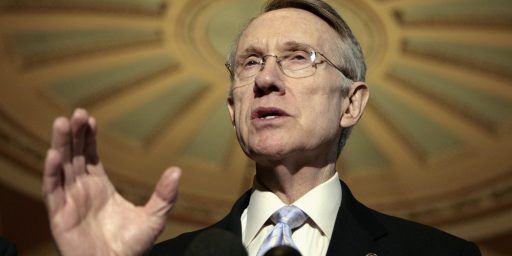Parliamentary Reconciliation Barriers
A series of loosely-related threads at memeorandum provide a fascinating insight into the American legislative process.
David Herszenhorn and Robert Pear report for the NYT Money & Policy section (“Parliamentary Hurdle Could Thwart Latest Health Care Overhaul Strategy“) on a potentially large fly in the reconciliation ointment:
The White House and Democratic Congressional leaders said Tuesday that they were bracing for a key procedural ruling that could complicate their effort to approve major health care legislation, by requiring President Obama to sign the bill into law before Congress could revise it through an expedited budget process.
An official determination on the matter could come within days from the House and Senate parliamentarians, and could present yet another hurdle for Mr. Obama and Democratic leaders as they try to lock in support from skittish lawmakers in the House.
[…]Many rank-and-file House Democrats are reluctant to approve the Senate-passed health care measure without a guarantee that the Senate would follow up with changes in a budget reconciliation bill. The Senate measure included a number of provisions House members dislike, including special deals intended to secure the support of individual senators, like extra Medicaid money for Nebraska.
Democratic leaders had been contemplating an intricate legislative two-step, by which the House would approve the original Senate health care measure and both chambers would adopt a package of changes in a budget reconciliation bill. Both measures would then be sent to Mr. Obama for his signature.
Some officials said House leaders were holding out hope for a favorable ruling by the parliamentarians that would allow them to proceed as planned — or to circumvent the problem.
But Senator Kent Conrad, Democrat of North Dakota and chairman of the Budget Committee, said the reconciliation instructions in last year’s budget resolution seemed to require that Mr. Obama sign the Senate bill into law before it could be changed. “It’s very hard to see how you draft, and hard to see how you score, a reconciliation bill to another bill that has not yet been passed and become law,” Mr. Conrad said. “I just advise you go read the reconciliation instructions and see if you think it has been met if it doesn’t become law.”
Meanwhile, The Hill‘s Michael O’Brien reports (“Kyl says GOP has the votes to stop some health bill fixes in the Senate“), the Republicans’ obstructionist-in-chief thinks he can stop the process regardless.
Republicans have the votes in the Senate to prevent key changes to Democrats’ healthcare package, Minority Whip Jon Kyl (R-Ariz.) asserted Wednesday.
Kyl, the second-ranking Republican in the Senate, said House Democrats should be wary of voting for the Senate’s healthcare bill under the assumption that another bill to make changes to that bill would necessarily make its way through the Senate.
Kyl suggested that the GOP would have enough votes to sustain points of order they might raise against a bill sought under budget reconciliation rules to make changes to the original health bill to win over the votes of House Democrats.
Meanwhile, the Senate’s top Democrat has had enough, writes HuffPo’s Sam Stein (“Harry Reid Pledges Filibuster Reform“).
Senate Majority Leader Harry Reid (D-Nev.) pledged on Wednesday to take a serious look at revising the filibuster rules at the beginning of the next Congress, calling the current level of obstruction in the Senate unacceptable.
In a reflection of the party’s commitment to changing the parliamentary rules, Sen. Chuck Schumer (D-N.Y.) followed the majority leader by saying that his committee would address the topic soon.
“The rules committee is going to start holding hearings on how to undo the filibuster rule,” said Schumer, who chairs the Senate Rules Committee. The New York Democrat told the Huffington Post after the speech that the hearings would take place two or three weeks from now.
[…]
Reid’s embrace of filibuster reform comes after he previously threw cold water on the likelihood of getting the rules changed. His reference to the “next Congress” stands out. To change Senate rules in the middle of the session requires 67 votes, which Democrats clearly don’t have. But changing the rules at the beginning of the 112th Congress will require the chair to declare the Senate is in a new session and can legally draft new rules. That ruling would be made by Vice President Joe Biden, who has spoken out against the current abuse of the filibuster. The ruling can be appealed, but that appeal can be defeated with a simple majority vote.
Of course, the latter could become academic if the Republicans retake the Senate majority as a result of November’s elections — a not entirely absurd possibility. One imagines that Reid and company will be less interested in hamstringing the minority then.
Regardless, Reid is at least onto something. The filibuster was created as a failsafe to ensure that radical changes in the American landscape weren’t enacted by narrow, partisan majorities. It has evolved into ensuring that nothing gets done if the minority party isn’t on board.
So, we either need to make filibusters harder or to make governing less partisan. The former is easier than the latter.






I think we probably need filibuster reform as well. I think we need to go back to 67 votes to break a filibuster, which was what it was until 1975. Before then, legislators understood that they needed to assemble broad coalition support for comprehensive reform. Now the threshold is too low that any party can hope to gain enough votes by beating up/sacrificing their own moderates. I think the rule change has contributed to partisanship.
“The filibuster was created as a failsafe to ensure that radical changes in the American landscape weren’t enacted by narrow, partisan majorities. It has evolved into ensuring that nothing gets done if the minority party isn’t on board.”
And this health care reform is what? A radical change in the American landscape being enacted by a narrow, partisan majority. This is exactly why we have filibusters and exactly why using reconciliation is wrong. The Republicans are right to use whatever methods available to stop this.
James – Were you for it when the Republicans wanted use the nuclear option for judicial nominees or only now? I didn’t read you then.
Without the filibuster how do you avoid the tyranny of the majority. And I am very much in agreement with Mr. Plunk. Most of us don’t want to be Europe, really, we don’t.
…Once more slowly…
…The Senate passed Health Care reform with 60 votes on Christmas Eve, defeating a filibuster threat.
…The House passed reform with a majority of house members.
…this reform is 80 years in coming and counting. To do nothing is to bankrupt America.